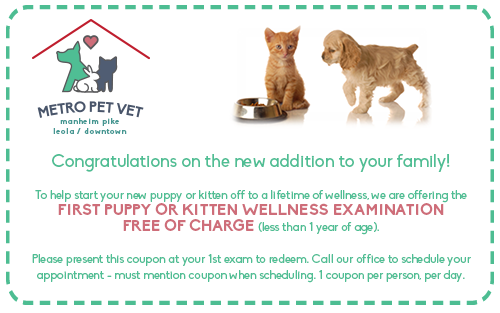Kitten Services at Metro Pet Vet
We want to make your kitten’s visits with us as relaxed as possible. You can help us by preparing your kitten for this with the following.
First Things First:
- Brushing their teeth, handling their feet and touching their ears will make our nose to tail examinations easier.
- Adjust them to getting their nails trimmed by manipulating each toe individually many times a day and always make the kitten behave during this time.
- At first, make these sessions short then gradually lengthen them.
- Handling their ears may make future ear cleaning easier.
Always make these sessions a positive experience and reward your kitten for being good. It IS possible to train a cat! Just look at all those crazy cat videos on YouTube!



Preventative Care Exam
A thorough physical exam is the most important part of your kitten’s visit. They will receive an exam from nose to tail. We want to be certain they are healthy before any vaccinations are given.

Fecal Sample
A fecal sample should be checked once a year on all pets. The most common intestinal parasites are roundworms, hookworms, whipworms and coccidia. Roundworms infect most kittens, but they do not show up in every fecal sample. Roundworms can also cause disease in humans, especially young children. For this reason, your kitten will be dewormed at their first visit, even if the fecal is negative.
The fecal is still important to identify any other parasites and determine the proper medications. Some intestinal worms can encyst in the wall of the intestine when your kitten is young and will be released to infect your pet during times of stress. For this reason, the CDC mandates that all pets should have a stool sample checked every six to twelve months. Revolution (a monthly parasite and flea preventative) will also deworm your cat for intestinal parasites. This is why we recommended giving preventative year round, not just in the months you see fleas.

Nutrition
Nutrition is an important part of your kitten’s health. Many cats have sensitive gastrointestinal tracts and become ill easily if their diet changes in any way. It is best to choose a quality food that is readily available and consistently feed that diet. Table scraps are not recommended and can make cats seriously ill.
It is important to use a measuring cup to feed your kitten a specific amount each day. Measuring a daily ration will allow easier evaluation of the actual amount your kitten is eating. This system is especially important if your kitten is ill or if weight management becomes an issue as an adult cat. As a kitten, if you can meal feed (usually 2-3 times per day) rather than feeding free choice, it will help with obesity. It can be a good thing to introduce your kitten to canned food at a young age. The majority of their diet should still be dry food but canned food can be beneficial as they get older. We recommend the following brands of food:
- Hill’s Science Diet
- Royal Canin
- Eukanuba
- Purina ONE or ProPlan formulas

Neutering
Neutering your pet has many important health and behavior benefits. They include eliminating ovarian cancer, testicular cancer, uterine cancer and uterine infections. It dramatically decreases the incidence of mammary cancer and prostate issues if done at a young age. It also virtually eliminates over-population problems. We recommend neutering your pet around 6 months of age. The health benefits are the greatest if females are spayed before her first heat cycle; aggression, roaming and marking behaviors can be greatly reduced or even eliminated by castrating a cat, even an older cat.

Dental Disease
Dental disease is an often overlooked part of pet care. This young age is the perfect time to get your pet accustomed to having its teeth brushed. Start by handling your kitten’s mouth often. Lift the lips and open the mouth while constantly reassuring and talking to your kitten. However, if they struggle too much or are nibbling and biting you, even if playing, they must be firmly held and given a firm “NO.”
Never give up when the kitten is not cooperating or it may cause future training sessions to become difficult. Always end on a positive note when the kitten has done something well. As they grow accustomed to this exercise, you can begin rubbing the gums gently with your fingers. Gradually over weeks or months, you can progress to using a toothbrush and special pet toothpaste. Do not use human toothpaste, as the fluoride content is too high for cats.

Flea and Tick Control
We have very effective, safe and easy solutions to controlling fleas and ticks on your kitten. We offer two topical products that can protect your new companion. At your kitten’s visit with the veterinarian, we will discuss their individual risks and find the perfect product to keep your kitten flea and tick free! There are many copycat products that are simply flea sprays packaged to look like brand name products but since they are totally unregulated they could potentially cause harm to any pet but especially cats.
What is the Most Important Thing to Know About Raising a Healthy Kitten?
Preventative care is essential when it comes to raising a healthy kitten. Kittens need vaccinations, flea and tick prevention, and exams. They also need a balanced diet and plenty of exercise and playtime. You also need to socialize your kitten to help them become comfortable around people and other animals.
The Right and Wrong Ways to Pick Up Your Kitten
It may be surprising, but there is a right way and wrong way to pick up a kitten. The wrong way is picking them up by their scruff, which can cause pain and injury. The right way is supporting their chest with one hand while using the other hand to support their hind legs and bottom. Keep them close to your body for support and comfort, but don’t hold them too tightly, as this can cause stress. If they become restless or agitated, gently place them back down on the ground. You may need to practice several times to get your kitten used to being picked up and held.
How to Tell if Your Kitten is Happy and Healthy
There are several signs to look out for to determine if your kitten is happy and healthy. Happy kittens purr, meow, eat regularly, groom, knead, use their litter box, and engage in playtime with toys or people. Many also snuggle up with their owners, but some felines are less affectionate than others. If your kitten is displaying these behaviors, it’s a good sign that they are healthy and content. Contact your veterinarian right away if you notice any sudden changes in your kitten’s behavior or think there might be something wrong.
.jpg)
How to Feed Your Kitten
Kittens and adult cats have different dietary needs, so it’s important to select a high-quality kitten food with a large proportion of animal-based protein, calcium, and phosphorus. This is because kittens need proper nutrition to support their rapid growth and high energy levels. Wet food is higher in moisture which can help with hydration, urinary tract health, and kidney function. Dry food is easier to feed in multi-cat households and can help with oral hygiene. However, some cats may overeat dry food and gain excessive weight leading to various health problems.
Kittens have higher energy needs than adult cats, making it difficult for them to get enough calories in one meal. We recommend feeding kittens three to four meals a day. Pay attention to your kitten’s specific nutritional needs, including protein, amino acids, minerals, and vitamins for healthy growth and development. When in doubt about what food best suits your cat’s needs, talk to your veterinarian.
Necessary Products for Your Kitten
There are several products you need to get for your new kitten, including food and water bowls, high-quality kitten food, a litter box, bedding, grooming supplies, toys, a scratching post or pad, a collar with contact information, an adjustable harness and leash for identification and outdoor exploration, and a pet carrier for transportation and vet visits. Your veterinarian may recommend supplements and other products to help your kitten thrive.
When to Take Your Kitten to the Vet and Get Vaccinations
Schedule your kitten’s first veterinary appointment as soon as possible after bringing them home. Kittens should start seeing a veterinarian when they are 6-8 weeks old. Because of this, your new family member may already have their first set of vaccines before going home with you. The remaining vaccinations will be administered in a series until your kitten is 16-20 weeks of age. Core vaccinations will protect your kitten from the most common diseases: feline distemper (panleukopenia), feline viral rhinotracheitis (feline herpes virus 1), calicivirus, and rabies. Veterinarians recommend non-core vaccines for kittens in certain areas or with specific lifestyles. For example, the feline leukemia vaccine (FeLV) is important for cats who live outdoors or spend time around outdoor cats. Your vet will help you determine which vaccinations are most important for your new feline friend.
Getting the Most Out of Your First Vet Visit
Your first vet visit with your kitten is an excellent opportunity to ask questions and learn more about caring for your new pet. Gather relevant paperwork such as adoption documents, medical records, and vaccination history. It’s also helpful to make a list of any medications or supplements your pet is on, along with the food they are being fed. Bring your kitten’s favorite treats for the vet and their staff to give them during their appointment, which can help build trust and positive associations with going to the vet. Plan to bring a stool sample to the visit to check for intestinal parasites. Be proactive by making a list of any symptoms your kitten is exhibiting along with your concerns. Don’t be afraid to bring things up and ask questions. This will help your veterinarian better understand your pet’s needs.
.jpg)
Early Signs of Health Issues in Your Kitten
Familiarize yourself with the early signs and symptoms of health issues in your kitten. Concerning symptoms include (but are not limited to) lethargy, loss of appetite, vomiting, diarrhea, sneezing, coughing, discharge from the eyes or nose, and changes in overall appearance or behavior. Common health issues affecting kittens include upper respiratory infections (URI), intestinal parasites, ear mites, and fleas. If you observe any of these signs in your kitten, take them to the vet for a checkup as soon as possible.
Avoid Self-Diagnosing Possible Kitten Health Problems
Self-diagnosing potential kitten health problems is risky for pet owners because it can lead to incorrect or delayed treatment and worsening of the condition. Veterinary professionals are specifically trained to identify and treat various health issues in animals and have access to specialized diagnostic tools and treatments that pet owners do not. Regular veterinary visits are essential for detecting emerging health problems, managing existing conditions, and providing guidance on how to maintain your kitten’s overall health. By trusting your kitten’s health to the experts, you can help them enjoy many healthy, happy years by your side.
Understanding Kitten Behavior
A kitten’s parents and littermates influence their behavior, so it’s important for them to spend time with their mother and siblings to learn appropriate social skills and how to be a cat. Kittens communicate using various vocalizations like meows, purring, hisses, and growls. They also use body language, such as rubbing, rolling over, and stretching. Understanding these signals can help you decipher your kitten’s needs and feelings.
Kittens are known for their playfulness, which is essential for developing vital adult skills. There are three main forms of play in kittens: social play with their mother or littermates; object play to develop eye-paw coordination and hunting skills; and locomotory play, which aids in developing balance and agility.
Kitten Care at Metro Pet Vet
Raising a kitten is a rewarding experience that will bring you joy and companionship for years to come. However, you must understand their needs to ensure a healthy, happy life. [Practice:name] is here to provide you with everything your kitten needs to enjoy a long, healthy, and happy life.
If you live in or near Lancaster, PA, and are looking for quality pet care, come visit us at Metro Pet Vet where your pet is our priority. Contact us at (717) 569-6424 to set an appointment, or email us at [email protected]. Our staff would love to talk with you!
Don't forget to follow us on social media: Facebook, Instagram.


